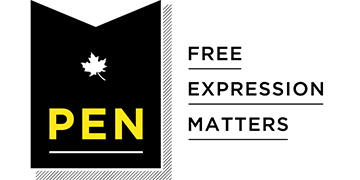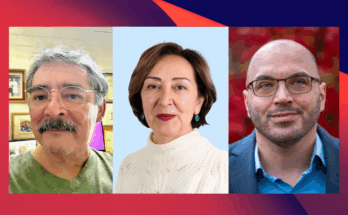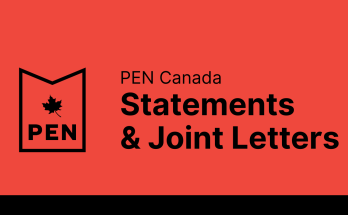Önder Deligöz is a Turkish journalist and author who currently resides in Canada. He was the 2018 PEN Canada Scholar at The Humber School for Writers.
Freedom is the biggest burden on the shoulders of an exiled journalist. While his colleagues yearn to see daylight, and their loved ones, again only one thing keeps his mind at ease — depriving those who take joy in imprisoning journalists from having the last laugh. Until the day that all journalists are free and are able to return to their homes, my happiness will be limited to that. But I have a painful confession to make. I was not unhappy to hear that my journalist friend of 15 years was not acquitted. I would go as far as to say that I was even somewhat happy he was sent back to prison after his hearing on March 31, 2017. Because that night we were introduced to another form of torture and I was happy that my good friend, Erme Soncan, was not going to be subjected to further suffering, suffering that would make his heart crumble for the millionth time.
Frankly, it was a statement that included accusations that would not be written in an indictment in a country that had the slightest regard for rule of law.
The regime had already resorted to all kinds of ways of silencing journalists, and it barbarically seized the newspaper where Emre worked. The satellite broadcast for the channel I worked at was shut down and we were left without jobs. Every time we uttered the words “It cannot get any worse” we soon found that it could. We witnessed this reality, once again, on the night of July 15, 2016.
After the failed coup, the concepts of terrorist and traitor were radically transformed. Now both could be used to describe anyone who criticized Erdoğan and his regime. Journalists became open targets, and 45 were arrested. Emre was among the unfortunate ones taken into custody on July 25, 2016.
In February 2017, their indictments were accepted and trials began. I was curious to find out what scenario the prosecutor would present in the indictment. On the 95th page of a 195-page indictment, 28 journalists’ “terror” activities were listed, with evidence. This included news articles, tweets, columns, and editorials that had angered President Erdoğan. Frankly, it was a statement that included accusations that would not be written in an indictment in a country that had the slightest regard for rule of law.
Emre was the 12th suspect in the indictment. The part that talked about Emre’s “terror” activity started with a paragraph that gave background to his school, doctoral degree, journalism, and books he wrote. The end of that paragraph read: “The open source search that was done regarding suspect Emre Soncan on the Internet is presented in detail below.” The rest of that page was worth reading to see the kind of injustice that journalists were subjected to, in order to raise awareness about it in the world — the prosecutor was referring to Google when he said “open source search.”
According to the documents retrieved from the Internet, the ‘terror’ activities Emre had participated in were his interviews in Zaman, a major newspaper prior to 2016, and Halk TV, where he talked about Abdullah Gul’s presidency. Then, Emre’s 28 tweets were listed as evidence of terror. The first tweet that led the prosecutor to identify Emre as a terrorist read: “I do not know if I would get detained for sharing this tweet, but I do not find it logical that the Gulen Movement is behind this vile and cowardly junta.” The tweet that he shared after the releases of journalists named Can Dundar and Erdem Gul, who were arrested prior to the coup attempt, was also used as evidence of crime: “I am very happy. I hope to hear good news regarding the other colleagues.” And some of the tweets that talk about the terror activities that Emre conducted are as follows:
05/25/2016 What does it mean for Erdoğan’s name to be mentioned in Zarrab’s case?
05/26/2016 The pressure that Prosecutor Bharara’s allegations on Zarrab case will cause on the regime, will return to the people as more authoritarianism
05/09/2016 It is impossible for this country to carry the weight of a regime that has evolved from democracy into authoritarianism, which has begun to turn into totalitarianism after December 17th.
01/06/2016 The December 17-25 corruption and bribery investigations were a chance for the country to “re-enlighten” and to purify itself. It is sad.
By stating in the indictment “When taken into consideration, the above and the open source searches in the case and the shares that the suspect has shared on his social media accounts…” the prosecutor makes clear that he is convinced of Emre’s membership in a terrorist organization. That is it. In undemocratic countries, declaring journalists to be terrorists is as easy as writing a script — one that would not even catch the attention of the worst filmmakers. When the accusation statement is read, the situation is no different for other journalists. When one randomly selects a name from the list of suspects, all that is offered as evidence of terrorist activity are news articles, tweets, and comments.
On the day of the first hearing, March 31, 2017, I closely followed the developments via Twitter. I finally came across the tweet that made me smile. Istanbul 25th Heavy Criminal Court Council had decided for the release of 21 journalists in the middle of the night. Many of my friends were going to be free. I was so happy. But Emre was not on the list. I was very upset about him and the four other journalists who were not released.
I was, once again, in between happiness and sadness. I was also hopeful. I kept thinking that “Emre and the others would be released in the next hearing.” Following the announcement of the release decision, too many weird things happened in Istanbul, leaving me feeling emotionless. As the released journalists were headed to the Silivri Prison to gather their belongings, journalists working for the government-funded media organs were making threats through their Twitter accounts. We could not have imagined that these individuals who were known for being the voices of the regime, could one day become the hangman of the palace.
First, the prosecutor objected to the ruling. The court council changed their decision regarding eight journalists. Then, another prosecutor created a new criminal case against 13 journalists and issued arrest warrants under the scope of a coup investigation. The eight journalists, who were gathering their belongings after being released, were told to return to their prison beds. The other 13 journalists were taken into custody once again. They were taken out of the prison that they thought they were going to be released from, with handcuffs, and brought to the police station before the eyes of their family members who were waiting outside for their release. They were subjected to insults, strip searches, hunger, and sleeplessness. With their news articles and tweets cited as evidence, they were re-arrested.
The first and last — we hope it is the last — example of Turkey’s judicial system being run by political directives is the torture that they put Ahmet Altan through.
The three judges who had ruled on the release of the journalists were suspended from their posts. These judges were not actually independent from the regime, but perhaps their tolerance for injustice had a limit. It was not difficult at all for the government to reappoint a council of judges whose tolerances for injustice were much higher. It was also not difficult at all for these new judges to sentence the journalists to more than five years at the last hearing.
One of the journalists who was released for a short period of time, only to get re-arrested, was Gultekin Avci who had been imprisoned for more than four years because of six columns published in the Bugun newspaper. He was released on the condition of judicial control on September 13, 2019. But the Istanbul Public Prosecutor could not allow the release of even one journalist and objected to his freedom. Avci, who could not even spend 24 hours with his family, was sent back to prison.
The first and last — we hope it is the last — example of Turkey’s judicial system being run by political directives is the torture that they put Ahmet Altan through. He was arrested on the ridiculous grounds of giving a ‘subliminal message’ to direct the military coup, detained on September 10, 2016, and released after 12 days of police interrogation. But the regime and Erdoğan supporters were not happy with his release and Ahmet Altan was only able to spend one night at his home as a free journalist. He was detained again on September 23, arrested, and sent to Silivri Prison. But Altan did not retreat at the hearing. He called on the judges to renounce the injustice by stating: “You are committing a crime and with the decisions that you make, you are writing your own indictment!” During this process, he wrote a book called “I Will Never See the World Again”. Finally, the judges made a somewhat lawful decision and released Altan on the condition of judicial control on November 4, 2019. I say “somewhat lawful” since it was the same court that sentenced Altan to 10 years and six months because of his writings and comments.
Altan, who was finally free again after 1,138 days of arrest, remembered the journalists who were tried alongside him and stated, “I felt a sense of sadness when I first heard about my release decision. The others were not released; I was very sad for them.” However, our worst fear came true again. The Istanbul Chief Public Prosecutor’s Office could not stand the freedom of yet another journalist and denied the release decision. We all knew that Ahmet Altan was going to get sent back to prison and it happened. Istanbul’s 27th Heavy Criminal Court accepted the refusal of the prosecutor’s office and canceled the court’s release decision. Altan was detained again after a week of freedom. He was rearrested on November 13, 2019 and was sent to Silivri Prison.



